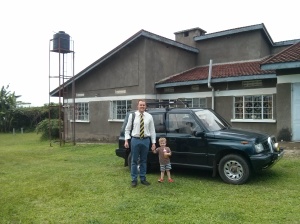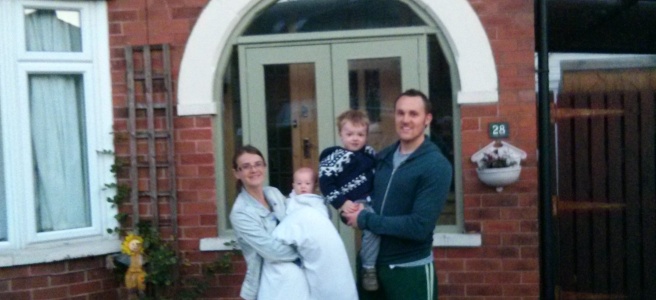Last week at church Jen played a new song which is modelled on an old hymn called ‘It is well with my soul’ if you want to see a couple of minutes of her singing this click on this link https://www.dropbox.com/s/pncbek4orgcvghr/VID_20150215_095932%20copy.mp4?dl=0 . The hymn is written by a man called Horatio Spafford in the 1870s. Apparently this man lost his then only son to scarlet fever when he was 4. He then lost everything he owned in the great Chicago fire. He went on to have 4 daughters and they planned a trip to the UK, but he had to send his wife and daughters ahead on a boat, planning to join them soon after. He then received a telegram from his wife that famously said ‘saved alone’. The boat had sunk, only his wife had survived. The story goes that as he went to join his wife the captain of the boat he was on pointed out to him the place where the boat his family had been on sunk, and where his 4 daughters had died. This is when he wrote the hymn, including the line ‘it is well, with my soul’. It is thought that this phrase or part of the song is based on a story from the Old Testament, in 2 Kings 4. Here a lady longs after a child after being barren, God gives her a son, and then he dies. When Elisha asks her how her family are she replies ‘it is well’.
This sort of tragedy was far more common in America and the UK in the past. Nowadays, to lose 5 children would be very unusual. It is more common here in Uganda. The official childhood mortality rate is 69 per 1000 livebirths (e.g. 69/1000 children die before the age of 5). Anecdotally I suspect this is a gross underestimation. Many babies are regarded as ‘stillborn’ when actually they were born alive when minimal efforts were made to resuscitate them and try and preserve their life. Also, the poorer here, as in the UK, are more likely to have bad ‘health outcomes’ and so the tragedy of children dying at birth, or at some stage during their early years, is more common among the poor. It seems to me that many of the women that I have seen in the government hospital who have had 6, 7, 8, 9, 10 children often only have half of them still alive.
So, how do people cope with this horrendous tragedy, this horrible burden of having child after child die. To think of either of my children being ill, or dying, or even just them suffering a little, is horrible. So far, nothing significant has happened to us. But how would I cope with this?
Unfortunately I can’t give you much insight to how the woman here cope with it. Those patients that I have seen that have lost many children, I struggle to communicate with as they don’t speak English, and even then I don’t have the time, or it is not the right situation to talk about it. Somehow they do cope, in that at the very least when I see them they are alive, and trying to have another baby.
This got me thinking about the concept of relative suffering. How one person feels about one event is not always the same as how someone else feels about the same or a similar event. Do these women somehow expect that they will have several children die? Do they see it happening to their own brothers and sisters, friends and therefore are more prepared for it? It is almost the norm to lose one or two, so is this easier to cope with for them then it would be for me? What would the equivalent suffering be for me – seeing my child be ill but recovering? Would me losing one equal 5 over here? Of course, I am being facetious to a degree. But maybe there is some truth in this idea of relative suffering depending on your circumstances.
How the mother feels or suffers is, however, secondary to the fact that the babies and children themselves are dying. As you have seen from my other posts, this is a serious, and potentially avoidable scenario in many of the cases I have seen, with a little more care and professionalism in the places I have worked.
So what of the response of Spafford or the Hebrew woman in the bible: ‘it is well’. How can it possibly be ‘well’ after your own children die. Again, I cannot say I know having never even been close to this sort of suffering. But I do believe their responses were with the knowledge that they had a relationship with a God whom they trusted, whom they knew was sovereign. By this I don’t mean He caused it, and not even that He ‘allowed it’, but that somehow He is in control and he would provide a means for them to cope with it. For them, in their soul, they were still well in the knowledge that God was for them, that all things happen for the good of those that love Him, even in the face of these events. Maybe even somehow bring God glory through it. In fact, with both of these examples this last point appears to be true. With Spafford this hymn is still sung today and has brought praise to God from thousands through it being sung and thought about. With the Hebrew woman, her son was later raised from the dead by Elisha.
Can we even go one step further? Well, this is what Jesus does with His life, His teachings. In the sermon on the mount, in the section known as ‘the beatitudes’ He does go one step further. In Matthew 5 v 4 He says ‘Blessed are those who mourn, for they will be comforted.’ So not only is there the promise of comfort, but somehow this is a blessing. Could it be that those who go through this horrendous scenario of losing children are somehow blessed by it? Please don’t hear what I am not saying. I don’t wish this on anyone, on myself. But if you read the rest of these blessing, it is not what we usually consider blessings. We sometimes hear that we are ‘blessed’ by a good job, by money, by good things happening to us. Do we really consider it a blessing to mourn, to be poor in spirit, to hunger for righteousness, to be persecuted?
The things I have seen here, haven’t ‘shaken my faith’ as could be suggested. Seeing suffering, children and mothers die, and seeing how apparently some of those who are meant to help them just stand-by, or worse, contribute to the suffering, doesn’t make me think ‘where is God in all this?’. It actually makes me think of sin, or how rejecting the person who made us and loves us, is what is wrong with the world. It makes me thankful that that person provided the answer, in that He provided His own son, to suffer and die, so that I, and anyone else, doesn’t have to go through the ultimate suffering of being forever separated from that person that made them. That suffering, which will be worse than anything seen on earth, can be avoided by choosing to follow Him. Unfortunately some of the suffering here on earth cannot be avoided, despite the efforts of men and women doing far better things than going to Uganda for 6 months to work in a hospital.
Notes
If you want to hear the modern version of the hymn that we sing in our church now it is on youtube: https://www.youtube.com/watch?v=YNqo4Un2uZI
And a longer blog post about Horatio Spafford that I reblogged earlier. Looking at other sources it seems reasonably reliable that these events did happen to him: https://todaysfreshmanna.wordpress.com/2010/11/09/an-inspiring-story-horatio-g-spafford/
Another interesting post I reblogged earlier as well about being ‘blessed’: https://theaccidentalmissionary.wordpress.com/2014/02/20/the-one-things-christians-should-stop-saying/
Also thanks to Pastor Doug here at Calvary Chapel, Fort Portal, who told us about the story behind the hymn ‘It is well with my soul’.






